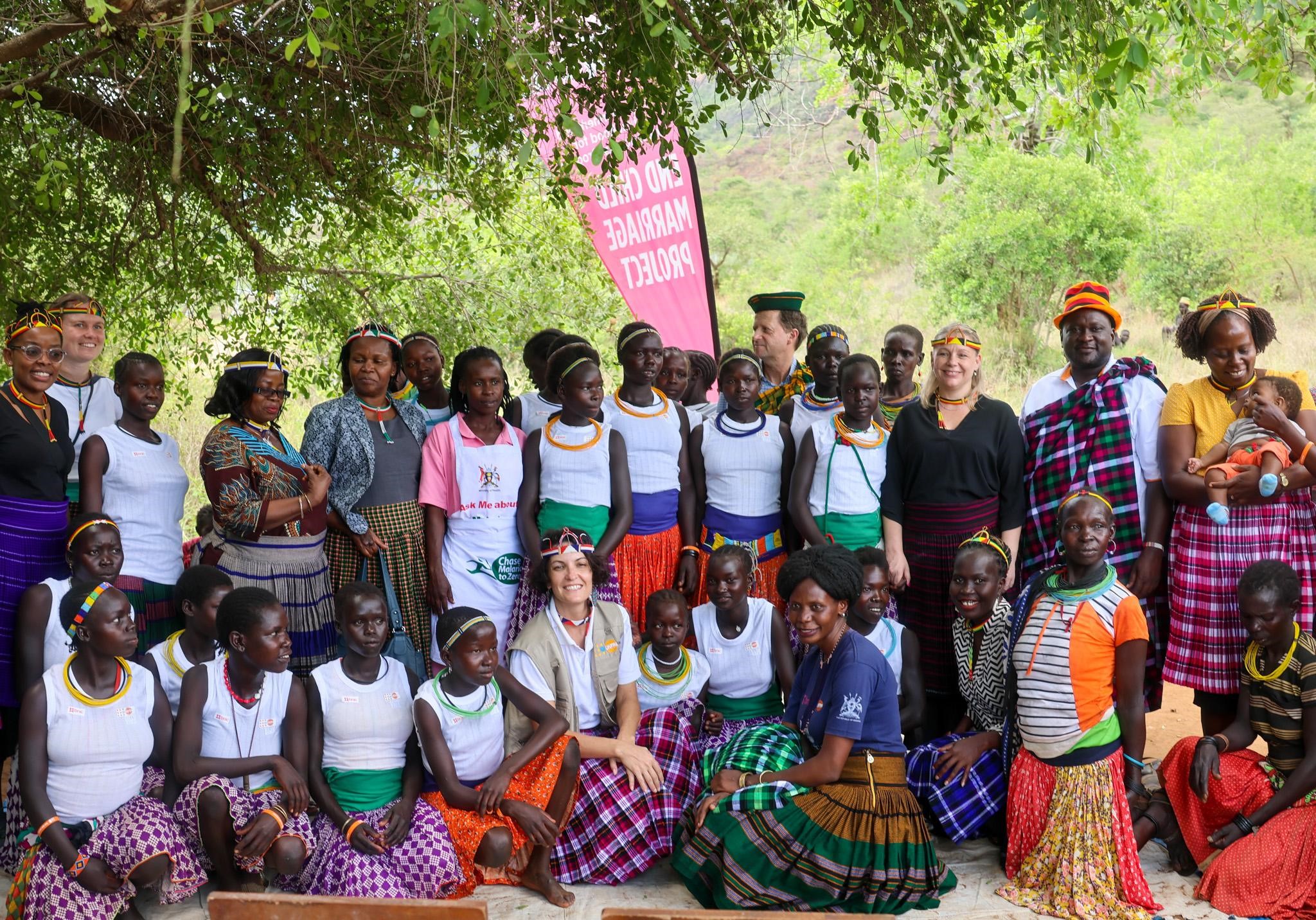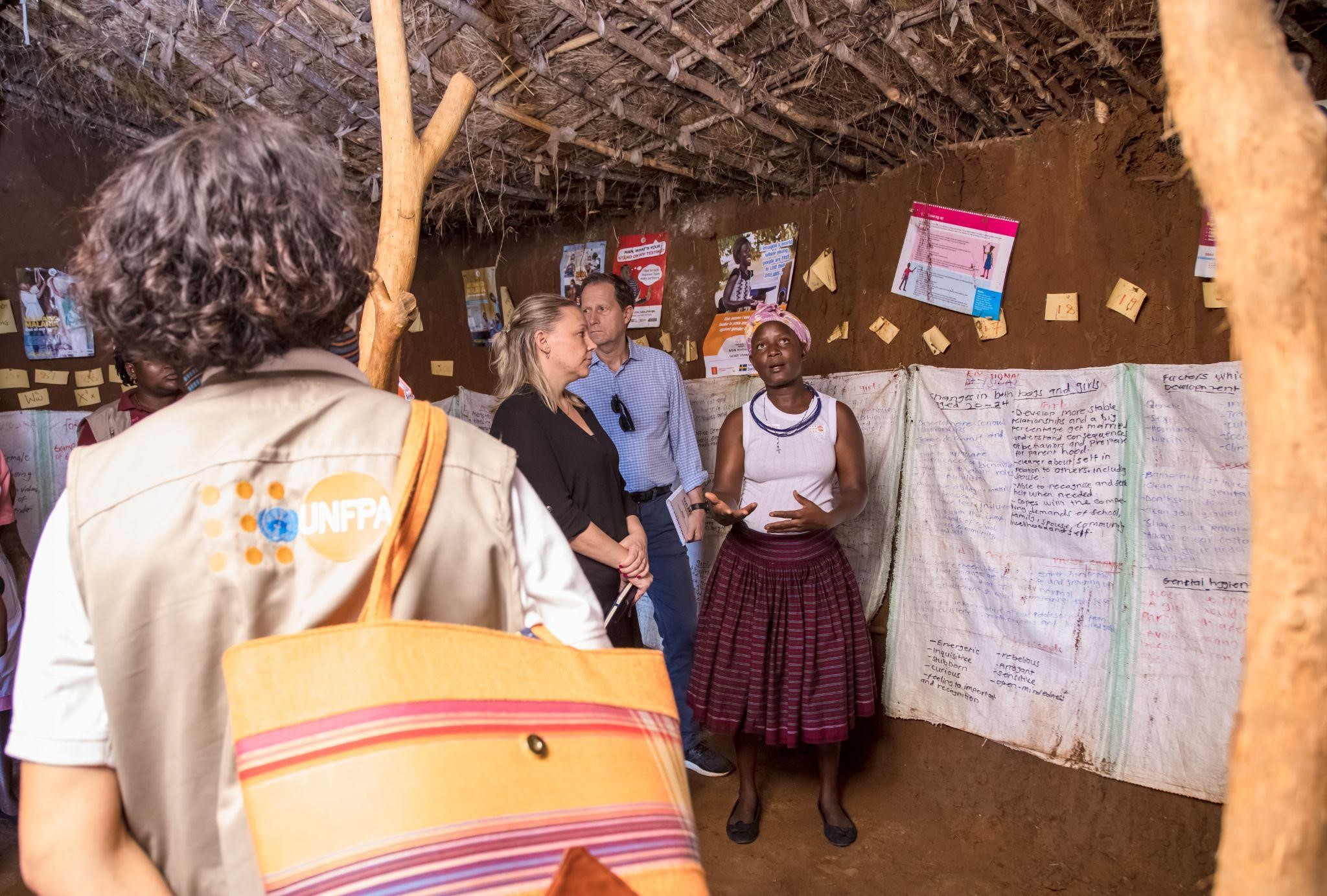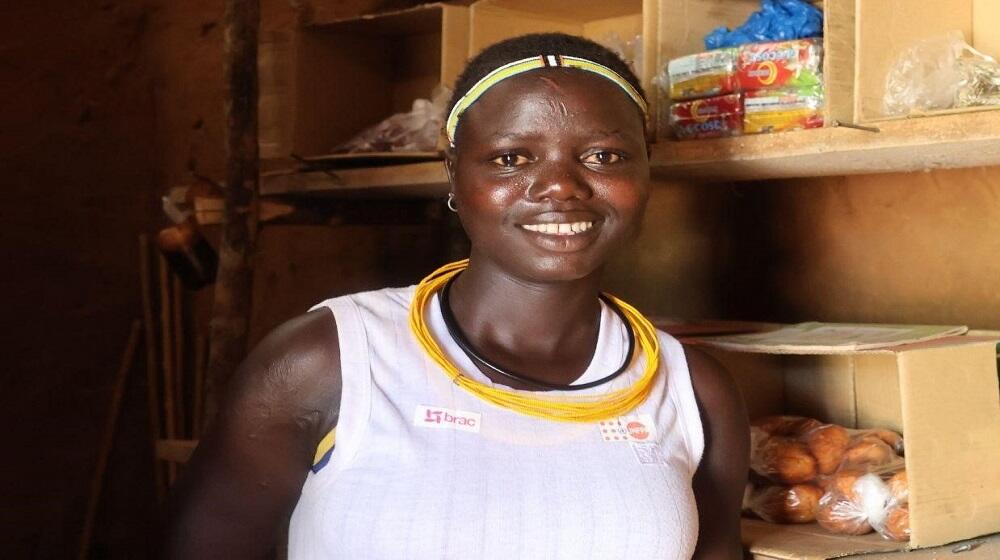Esther's story unfolds against the rugged yet beautiful valley of Moroto, a town etched with the traditions of its people. Because we arrive during the rainy season, it is difficult to reconcile the lush green that spans this terrain and the tales of hunger and violence that has ravaged the strong people of Moroto, the Karamajong. Yet amidst this history, Esther's journey shimmers with defiance and determination.
At twenty years old, Esther Nashap defied the norms entrenched in her community. While many girls her age succumbed to the weight of early marriages and the burden of expected motherhood, Esther carved a different path. Her story was one of resilience, fueled by the support of an unconventional ally – a savings group run by BRAC under UNFPA's Joint Programme on Gender-based Violence (JPGBV), funded by Sweden in Uganda.
Six months ago, Esther embarked on a venture that set her apart from her peers. With the loan money she borrowed from the savings group, she opened a modest retail shop. It was a humble endeavor, but it was hers. Each day, she toiled in her shop, diligently serving customers and managing her inventory. From this endeavor, she says she is able to earn roughly up to Shs 350,000 (USD 100) a sum that provides a glimmer of financial independence.
But Esther's defiance transcended mere economic empowerment. It stemmed from a deeper understanding instilled in her by the savings group. She learned about hygiene, about the value of education and about the perils of early marriage. In a community where girls were groomed for marriage as soon as they entered adolescence, Esther dared to challenge the status quo.

Esther is carrying her first born and hopes to have only 3 children. “I joined the club when I was still young and they kept telling us that when a girl gets married while young, she can get problems giving birth but also will not be able to look after their child...” Esther reflects proudly. “I kept telling my parents that if they want to marry me off I will report them to the police. Perpetua had told us that we can report any kind of abuse to the police!”
Esther is carrying her first baby and proudly says that she has been able to delay getting pregnant by using Sayana Press. For a girl whose culture expected her to deliver by age of 12, Esther has triumphed over the obstacles predestined by her society’s norms. She is able to negotiate with her husband on the desired child spacing. She has attained bodily autonomy!
Her mentor, Lokeris Perpetua, played a pivotal role in Esther's journey. Perpetua, a vibrant volunteer in the village, dedicated her time to mentor girls like Esther. Armed with knowledge and empathy, Perpetua guided them through the complexities of womanhood. She empowered them to embrace their education, to understand their bodies, and to resist the pressures of early marriage.
Esther's resolve was tested as she witnessed friends succumb to the fate of early marriage. Girls she grew up with, married off before they even reached their teenage years. Yet Esther remained steadfast, fortified by the wisdom imparted to her by the savings group and her mentor.
While Esther has been empowered to thrive, many girls in Karamoja still face immense challenges. In this region, women and girls are denied equal rights to males with society’s expectation of women and girls limited to marriage, child bearing and looking after their household. A man’s role is only to look after cows, while the women look for food, firewood and even build the houses. Education levels continue to rank very low in comparison to the rest of Uganda.
With prolonged drought and cattle rustling, economic activity for most remains alcohol brewing, a business in which women and girls find themselves entering.
The United Nations Joint Programme on Gender-based Violence was funded by the Embassy of Sweden in Uganda to combat the inequalities that exist in Karamoja and Northern regions, accelerate justice for survivors of sexual and gender-based violence and improve the economic livelihood of women and girls restoring their dignity and bodily autonomy.

Esther’s story offers a glimmer of hope for the girls and women of Karamoja. Amidst the throngs of tradition and the echoes of societal expectations, Esther stood tall. She refused to be defined by the narrow confines of her community's norms. For Esther, marriage was not the only path available to a girl. She aspired for more – for herself, for her future children, and for the generations to come.
As Esther's belly swells with the promise of a new life, she dreams of a different future. A future where her children would inherit not just her resilience, but also the opportunities she fought to create. Esther embodied the spirit of defiance and hope.
Esther is one among the many girls who are getting a chance at life thanks to the generous support from the Embassy of Sweden in Uganda. With funding from the Swedish government, UNFPA has worked with BRAC Uganda supporting over 72 Empowerment and Livelihood for Adolescents (ELA) clubs reaching 10,625 girls, empowering them with knowledge and skills to face life, as well as challenging negative social norms and attain justice for themselves and their peers. Key interventions delivered include menstrual management sessions, sexual and reproductive health and rights (SRHR), gender-based violence (GBV), growth changes, integrated outreaches, dialogues, and engagement with parents on retention of children in school, among others.
- Written by Prisca Uwera Kalenzi


